REPAIR/REPLACE LAUDAU TOP PROCEDURE TO R/R TOP

VEHICIES AFFECTED: 1984 Buick 4AH27 and 4AL27 Styles
Landau Top Cap Assembly
Remove or Disconnect
1. Mask completely around the top, side and rear edges of the cap. Lay a protective cover over the roof and the rear compartment lid surfaces.
2. Using a suitable pry tool such as a tack puller, work the left and right quarter belt reveal and rear belt reveal mouldings out of the barrel nuts (2, 4 and 6 Fig. 1).
3. Using a 3.5 mm (9/64 inch) drill with a 9.5 mm (3/8 inch) drill stop, drill out the two rivets holding the left and the right quarter belt corner mouldings (5, Fig. 1) and remove the mouldings.
4. Remove the screws securing the left and the right roof moulding (Fig. 2) to the door pillar and pull the moulding straight out from the clips on the roof panel.
5. Peel the vinyl back along the front edge of the cap to expose the attaching rivets.
6. Using a 3.5 mm (9/64 inch) drill with a 9.5 mm (3/8 inch) drill stop, drill out the rivets along the front of the cap.
7. Using a pry type tool, work the front of cap free as much as possible from the cement bond. Loosen approximately 150 mm (6 inch).
8. With the assistance of a helper, work the rear of the cap free from the roof sail panels by lifting upward to free the rear of cap from the roof.
9. Lift the cap off.
Disassemble
1. The spring clips (4, Fig. 3) from the pins on the quarter window bezel. (1).
NOTICE: Do not pull on the inside of the bezel frame as the plastic is easily cracked. Pins may break off upon removal of the clips.
2. Pull the bezel out and downward at the buttom to free the retainer clips (3, Fig. 3) at the top of the bezel.
3. Speednuts from the studs and emblems.
Clean
1. The butyl tape or caulking from across the front of the roof and beltline area. If the cap is reused, clean the tape from the underside of the cap.
IMPORTANT: The butyle caulking may be easily removed by pressing the body tape onto it and lifting it off.
2. The rivet holes and barrel nuts.
IMPORTANT: It is not necessary to remove all the red roof caulking, only remove the high spots. Assemble -------- 1. The emblems and speednuts.
2. The quarter window bezels into place and secure with some clips.
Install or Connect
1. Apply a new bead of caulking next to the old caulking using Automotive Bedding and Glasing Compound 3M 08509 or equivalent (Fig. 4).
2. Install 25 mm x 1.5 mm thick (1 inch x 1/16 inch) double-sided butyl or equivalent tape to the front edge of the cap (1,Fig.5).
3. With the aid of a helper, position the cap onto the roof and align it to the old rivet holes.
4. Install one rivet at each corner and at the centre front to locate the cap before installing the balance of the rivets.
IMPORTANT: New rivets must be of the aluminum closed-end type to prevent waterleaks. In addition, the rivet heads must be flush with the cap surface. File as required.
5. Apply a Vinyl Trim Adhesive (No. 3M-80648 or equivalent) Lo the front edge of the cap and roof panel out to the centerline of the mouldiny studs.
6. Stretch and secure the vinyl to the roof panel.
7. Rivet the quarter belt corner mouldings to the body using the closed-end rivets.
IMPORTANT: The corner belt moldings require longer rivets.
8. Apply a non-corrosive type silicone sealer such as 3M-08660 or General Electric R.V.P. Sealant or equivalent into the barrel nut holes and install the quarter and rear end belt reveal mouldings.
9. Remove the protective coverings and clean up the car as required.
Valance
Remove or Disconnect
1. Lay the protective cover over the rear compartment lid surface.
2. Using a suitable pry type tool, work the left and rignt rear belt reveal moulding out of the barrel nuts (2 and 4, Fig. 1).
3. Remove the rear belt reveal mouldings and belt escutcheon (2, 3 and 4, Fig. 1).
4. Pull the vinyl material up approximately 50 mm (2 inch) to expose the rivets at the rear roof valance (7, Fig. 1).
5. Using a 3.5 mm (9/64 inch) drill with a 3/8 inch drill stop, drill out the rivets and remove the valance.
Install or Connect
1. Align the valance with the previous attaching holes and secure them with the closed-end rivets. Be sure that the rivet heads are flush with the surface of the valance panel to avoid a highlighting of the rivets when covered.
2. Apply a 3M Vinyl Trim Adhesive (No. 3M-80648 or equivalent) to the vinyl flaps of the valance and to the valance above the centerline of the rivet holes. Stretch and secure the vinyl to the valance.
3. Apply a non-corrosive type silicone sealer such as 3M-08660 or General Electric R.V.P. Sealant or equivalent into the rivet and barrel nut holes and install the corner, the rear quarter and the rear end belt reveal mouldings.
4. Remove the protective coverings and clean-up the car as required.
Landau Roof Moulding(Left or Right)
Remove or Disconnect
1. Tape a protective covering to the adjacent painted surfaces.
2. Remove the screws securing the left and/or right roof moulding to the door pillar and pull the moulding straight out from the clips on the roof panel (Fig. 2).
Install or Connect
1. Slide the moulding onto the clips on the roof panel.
2. Install the screws securing the roof moulding to the pillar.
Quarter Belt Corner Moulding - (Left or Right)
Remove or Disconnect
1. Tape a protective covering to the adjacent painted surface.
2. Using a pry tool, work the quarter belt reveal moulding (6, Fig. 1) from the barrel nuts in the panel.
3. Using a pry tool, work the rear belt reveal moulding (2 or 4, Fig. 1) from the barrel nuts in the panel.
4. Using a 3.5 mm (9/64 inch) drill with a 9.5 mm (3/8 inch) drill stop, drill out the rivets in the quarter belt corner mouldings (5, Fig. 1).
5. Remove the quarter belt corner mouldings.
Install or Connect
1. Align the quarter belt corner moulding with the previous attaching holes and secure with the closed-end rivets.
2. Align the rear belt reveal moulding clips with the barrel nuts in the panel and secure by lightly tapping the moulding into place with a rubber mallet.
3. Align the quarter belt reveal moulding clips with the barrel nuts in the panel. Secure by lightly tapping the moulding with a rubber mallet.
Rear Belt Reveal Moulding (Left or Right)
Remove or Disconnect
1. Tape a protective covering to the adjacent painted surfaces.
2. Using a pry tool, work the rear belt reveal moulding (2 or 4, Fig. 1) from barrel nuts.
3. Remove the rear belt reveal moulding and moulding clips.
Install or Connect
1. Connect the clips to the moulding.
2. Align the moulding clips with the barrel nuts in the panel and secure by lightly tapping the moulding into place with a rubber mallet.
Quarter Belt Reveal Moulding (Left or Right)
Remove or Disconnect
1. Tape a protective covering to the adjacent painted surfaces.
2. Using a pry tool. work the quarter belt reveal moulding (6, Fig. 1) from barrel nuts.
3. Remove the quarter belt reveal moulding and moulding clips.
Install or Connect
1. Connect the clips to moulding.
2. Align the moulding clips with the barrel nuts in the panel and secure by lightly tapping the moulding into place with a rubber mallet.
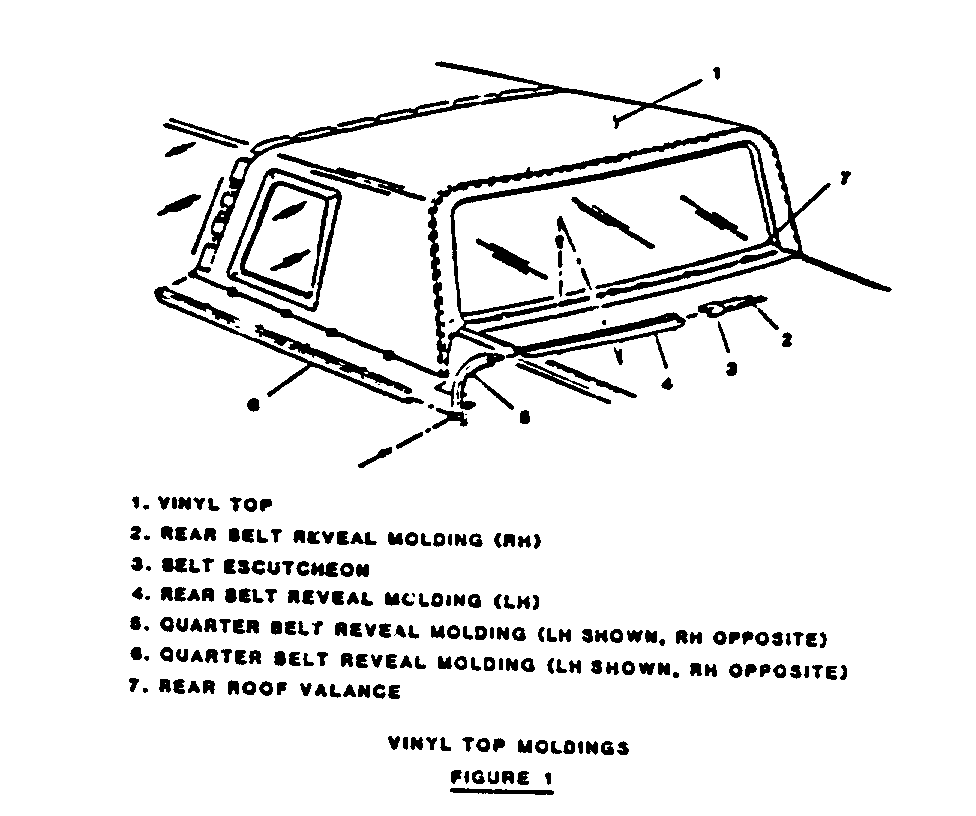
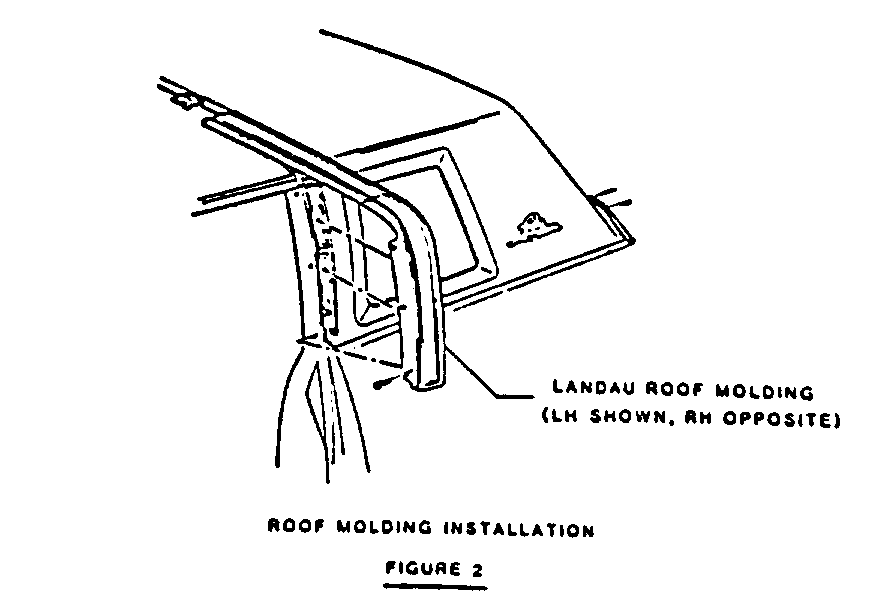
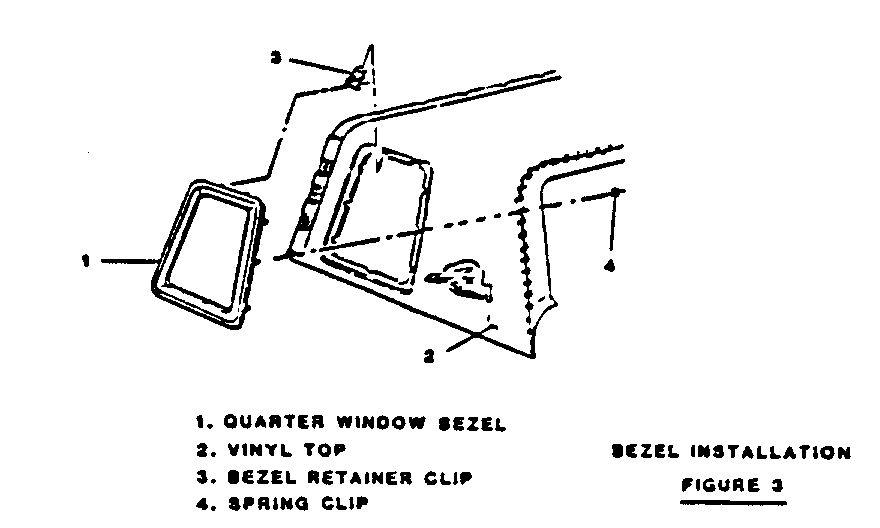
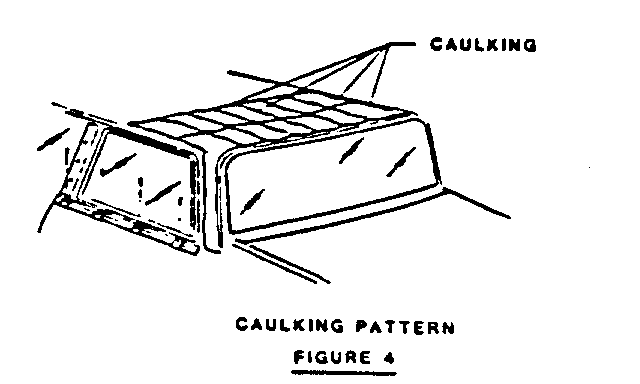
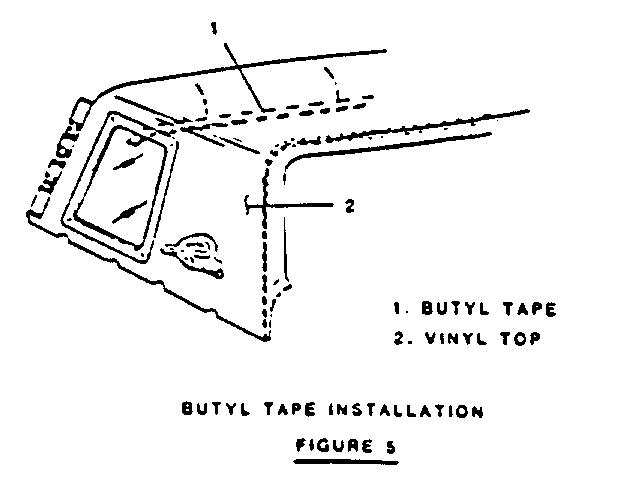
General Motors bulletins are intended for use by professional technicians, not a "do-it-yourselfer". They are written to inform those technicians of conditions that may occur on some vehicles, or to provide information that could assist in the proper service of a vehicle. Properly trained technicians have the equipment, tools, safety instructions and know-how to do a job properly and safely. If a condition is described, do not assume that the bulletin applies to your vehicle, or that your vehicle will have that condition. See a General Motors dealer servicing your brand of General Motors vehicle for information on whether your vehicle may benefit from the information.
